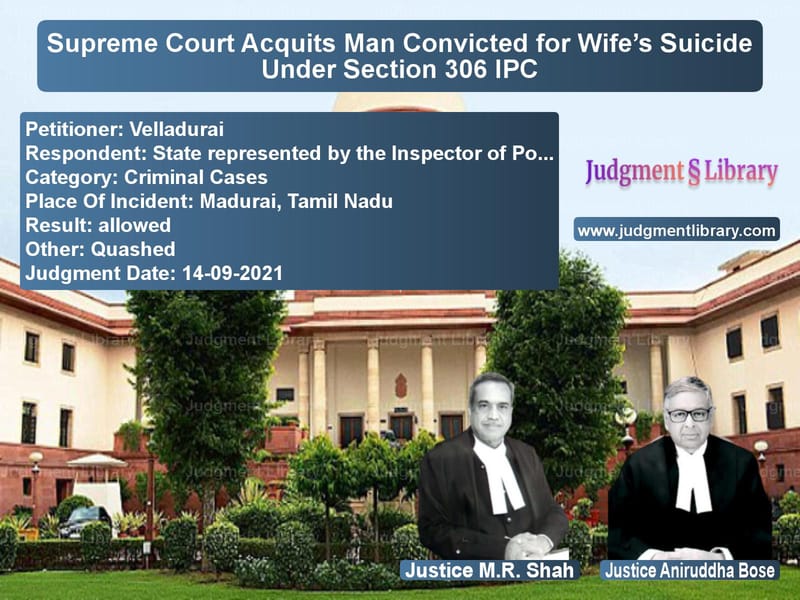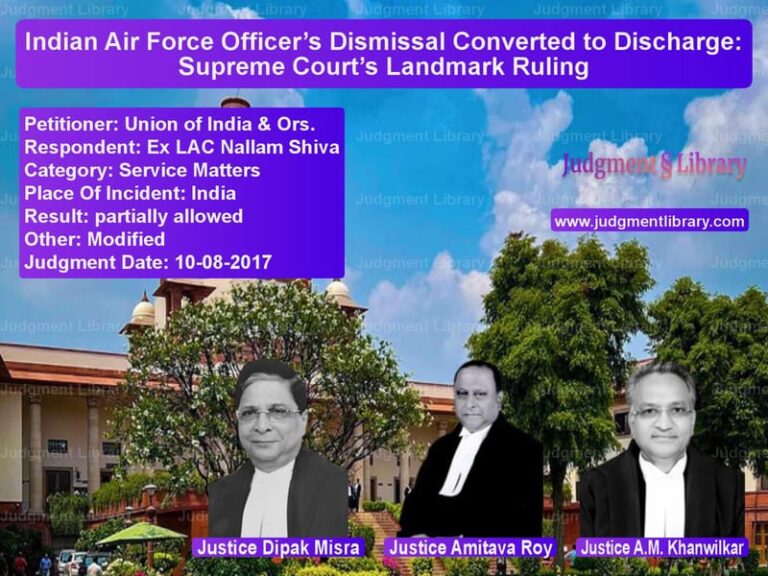Supreme Court Acquits Man Convicted for Wife’s Suicide Under Section 306 IPC
The Supreme Court of India, in a significant ruling, acquitted Velladurai, who was previously convicted under Section 306 IPC for allegedly abetting the suicide of his wife. The Court found that there was no evidence of active instigation by the accused, and that both the accused and the deceased had consumed poison together after a marital dispute. The decision underscores the legal threshold required for proving abetment of suicide.
Background of the Case
The case pertains to an incident that took place on May 7, 2007. Velladurai and his wife had been married for 25 years and had three children. On the day of the incident, the couple had a quarrel, following which both consumed pesticide. While Velladurai survived after medical treatment, his wife succumbed to poisoning. The younger brother of the deceased filed a complaint, alleging that the accused had an extramarital affair, leading to frequent quarrels. A local panchayat had also intervened in the couple’s disputes prior to the tragic event.
Trial Court’s Decision
The Trial Court found Velladurai guilty under:
- Section 306 IPC (Abetment of Suicide) – Sentenced to 7 years rigorous imprisonment.
- Section 4(b) of the Tamil Nadu Prohibition of Harassment of Women Act – Sentenced to 3 years rigorous imprisonment.
- A fine of Rs. 2500 was imposed for each conviction, with a default sentence of 3 months simple imprisonment.
High Court’s Judgment
Velladurai appealed to the Madras High Court, Madurai Bench. While the High Court upheld his conviction under Section 306 IPC, it reduced the sentence from 7 years to 3 years rigorous imprisonment. However, it did not provide relief concerning his conviction.
Arguments by the Petitioner (Velladurai)
- The defense argued that there was no clear evidence proving that the accused had actively instigated or forced the deceased to commit suicide.
- It was contended that both spouses had consumed pesticide together, and the accused had also suffered serious health complications.
- The defense pointed out that PW2, the couple’s daughter, turned hostile and did not support the prosecution’s case.
- The conviction was based on mere allegations of an illicit relationship, which were not substantiated with direct evidence.
Arguments by the Respondent (State of Tamil Nadu)
- The prosecution argued that the accused had a history of quarreling with the deceased due to an alleged extramarital affair.
- The police report noted that multiple disputes had taken place, leading to mental distress for the deceased.
- The brother of the deceased testified that the accused’s conduct had pushed the victim to take the extreme step.
- The state sought to maintain the conviction, arguing that abetment could be inferred from the circumstances.
Supreme Court’s Key Observations
- The Supreme Court ruled that mere harassment or marital discord does not amount to instigation under Section 306 IPC.
- The Court emphasized that abetment requires active involvement—an act of provocation or encouragement.
- It noted that there was no suicide note, nor was there any direct evidence showing that the accused had forced or pressured the deceased to take her life.
- The couple had both consumed pesticide together, indicating that it was a spontaneous act rather than an instigated suicide.
- The Court pointed out that the presumption under Section 113-A of the Evidence Act does not apply as the marriage was over 25 years old.
Final Verdict
Based on these findings, the Supreme Court:
- Allowed the appeal and acquitted the accused.
- Quashed the conviction under Section 306 IPC and Section 4(b) of the Tamil Nadu Prohibition of Harassment of Women Act.
- Ordered that the accused’s bail bonds be discharged.
Implications of the Judgment
This judgment has significant implications for cases involving allegations of abetment to suicide:
- Clarification of Abetment Law: The ruling reinforces that mere quarrels or discord do not amount to abetment under Section 306 IPC.
- Need for Direct Evidence: Courts must examine active encouragement before convicting someone for abetment of suicide.
- Protection of the Accused: Individuals facing unfounded allegations cannot be convicted without substantive proof.
- Revisiting Marital Disputes: The decision highlights that courts must differentiate between routine marital disputes and cases of harassment leading to suicide.
- Burden of Proof: The prosecution must establish a clear link between the accused’s actions and the suicide for conviction.
Analysis of Suicide Cases Under Section 306 IPC
Section 306 IPC deals with the crime of abetment of suicide, which is punishable with imprisonment for up to 10 years. However, not all cases of suicide result in conviction under this provision. Courts typically look for:
- Presence of a Suicide Note: Written evidence implicating the accused.
- Direct Provocation: Any threats, coercion, or active encouragement.
- Past Incidents: A pattern of cruelty or sustained harassment.
- Proximity in Time: Whether the accused’s actions directly led to the act.
Impact on Future Criminal Trials
This Supreme Court judgment serves as an important precedent. It sets clear standards for what constitutes abetment and reinforces that every suicide does not automatically warrant a conviction under Section 306 IPC. Future trials involving marital discord and suicides will now require courts to:
- Evaluate evidence of direct instigation before ruling on abetment.
- Ensure that allegations of harassment are supported by objective proof.
- Avoid wrongful convictions based on assumptions or circumstantial evidence alone.
Conclusion
The Supreme Court’s verdict in Velladurai vs. State provides clarity on abetment laws and sets an important precedent in criminal jurisprudence. By acquitting the accused, the Court emphasized the necessity of proving active instigation beyond mere quarrels. The judgment reinforces that legal standards must be met before convicting individuals for serious offenses, ensuring justice prevails while preventing wrongful convictions.
Petitioner Name: Velladurai.Respondent Name: State represented by the Inspector of Police.Judgment By: Justice M.R. Shah, Justice Aniruddha Bose.Place Of Incident: Madurai, Tamil Nadu.Judgment Date: 14-09-2021.
Don’t miss out on the full details! Download the complete judgment in PDF format below and gain valuable insights instantly!
Download Judgment: velladurai-vs-state-represented-by-supreme-court-of-india-judgment-dated-14-09-2021.pdf
Directly Download Judgment: Directly download this Judgment
See all petitions in Suicide Cases
See all petitions in SC/ST Act Case
See all petitions in Judgment by Mukeshkumar Rasikbhai Shah
See all petitions in Judgment by Aniruddha Bose
See all petitions in allowed
See all petitions in Quashed
See all petitions in supreme court of India judgments September 2021
See all petitions in 2021 judgments
See all posts in Criminal Cases Category
See all allowed petitions in Criminal Cases Category
See all Dismissed petitions in Criminal Cases Category
See all partially allowed petitions in Criminal Cases Category







